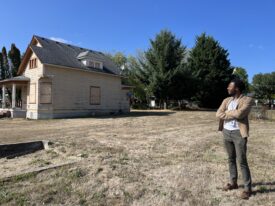Six kids, to be exact.
The Vancouver Courier profiles the Spino family—2 parents and 6 kids who live in a 3-bedroom condo in downtown Vancouver. It’s an interesting read, as well as a good reminder that, for some families, downtown living makes a lot of sense. Says the pater familias:
“I don’t see the need for having rooms in houses that you don’t use. I don’t see why you have two spare bedrooms for visitors that you just use to store boxes. I don’t think that’s efficient. I don’t think that’s a responsible way to live…You don’t need that space. You don’t need skis in the garage or a snowmobile somewhere and stuff in the attic-all that consumerism collecting. I don’t think we’re occupying a lot of space here. This high-density living is good for the city. It’s good for the environment. It’s good for the children-it’s a fantastic way to live.”
One thing that the article doesn’t mention is that, because the Spinos probably drive less and walk more than most comparable suburban families, their neighborhood could actually be good for their health. Residents of compact, transit- and pedestrian-oriented neighborhoods tend to suffer fewer fatal car crashes (the leading killer of children!), walk more for transportation, and have lower rates of obesity, than folks in sprawling suburbs. One juicy stat: downtown Vancouver has lowest risk of fatal car crashes of any part of BC, with a fatal car crash rate that’s about one-third the province-wide average.
Stay tuned. We’ll have much more on the health benefits of compact communities when we release Cascadia Scorecard 2006: Focus on Sprawl and Health next week.








K
* Real people own things, other than clothes, beds, and dishes. There has to be someplace to put it.* Where do 6 kids sleep in 2 bedrooms? What happens when those two babies grow up and need their own bed? This is presuming they are lucky to have an even split in child gender. Do you let teenage girls and boys share a bedroom? * “The couple bought it three years ago before skyrocketing real estate priced many out of the market.” Number one reason why this is not a very practical option for the average person.* “Easy access to public transportation minimized the need for cars.” That’s what’s really needed. Make downtown living affordable and practical, and it’ll catch on.* “There’s nothing but families in downtown [Goteborg] because you live close to where you work.” Add “living wage jobs” to the above list of necessary downtown amenities.* “…families watch each other’s children.” This is a recurring theme of “sustainable family” stories, which is that they are dependent on the community. This is important. You need to both find an inviting or engaging community, and at the same time you have to be a social person. The barriers to this life pile up.These stories make those who live where housing is cheap and work where wages are adequate and therefore have to commute between the two (and to the grocery store, school, events, etc.) seem like irresposible yuppies, but actually we’re just living within practical reality. Make sustainable living affordable and practical (as in, you won’t be broke after a year), and it’ll catch on.